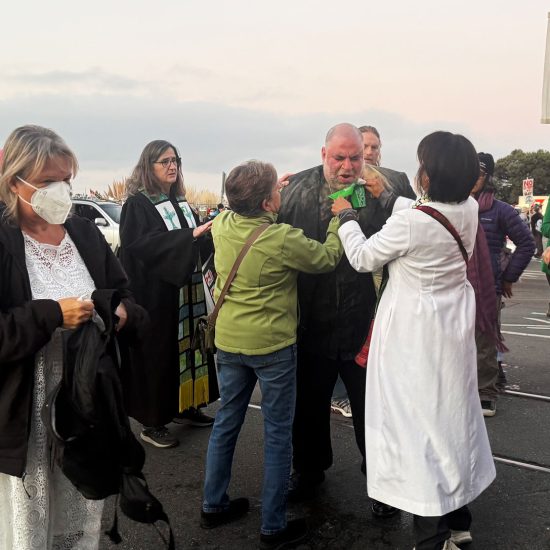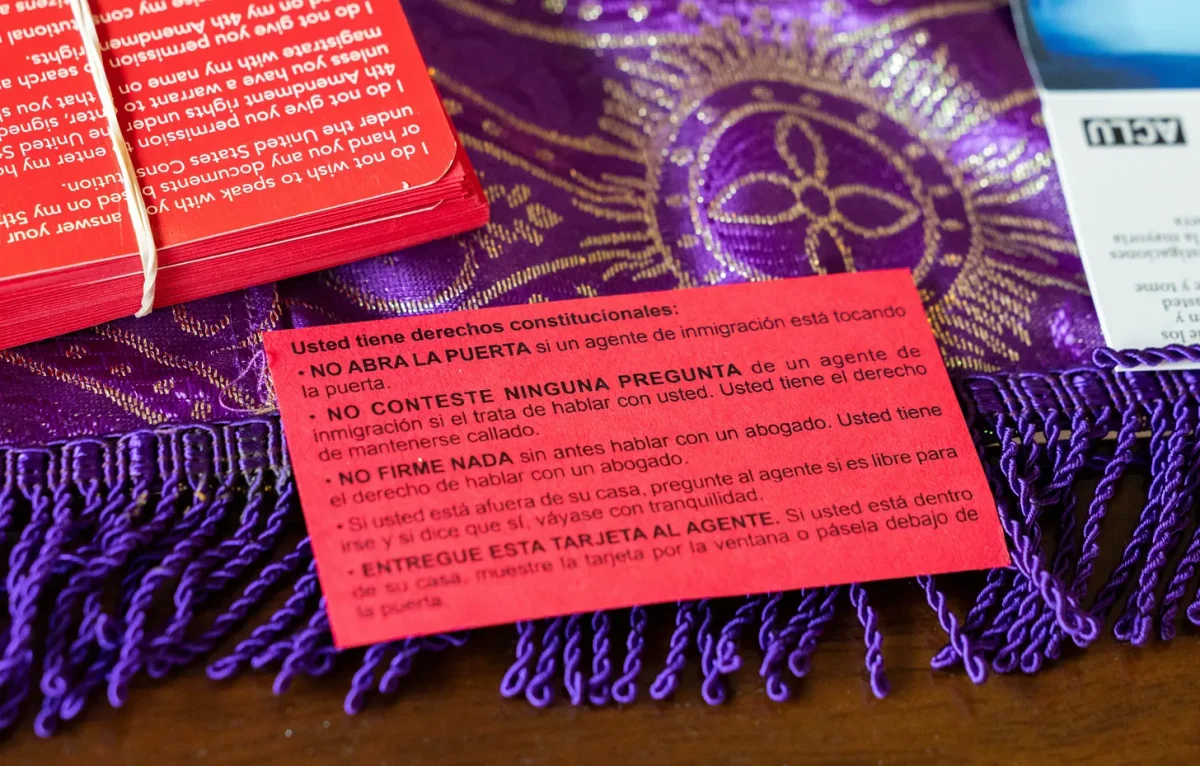
WASHINGTON (RNS) — A new report published by four prominent Catholic and evangelical organizations claims that around 1 in 12 Christians in the U.S. are vulnerable to deportation or live with a family member who could be deported by President Donald Trump’s administration, one of several data points religious leaders hope will alert Christians to the plight facing their fellow faithful.
“We’re sounding the alarm that all American Christians need to be aware of what’s being proposed,” Matthew Soerens of World Relief, one of the authors of the report, said during a call with reporters on Monday (March 31). He spoke alongside representatives from other well-known religious organizations listed as co-authors on the report: the U.S. Conference of Catholic Bishops, the National Association of Evangelicals, and the Center for the Study of Global Christianity at Gordon-Conwell Theological Seminary.
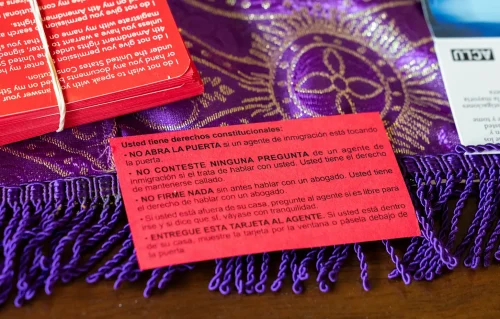
Cards detailing migrants’ rights sit on a table at San Pablo Methodist Church in San Juan, Puerto Rico, on March 14, 2025. (Alejandro Granadillo/Associated Press)
“Our prayer with this report is that American Christians will recognize that these proposed deportations, to whatever extent they ultimately become a reality, are not just a policy issue but a dynamic that will impact us, followers of Jesus who were knit together in unity under Christ,” Soerens said.
The report, titled “One Part of the Body: The Potential Impact of Deportations on American Christian Families,” a reference to the biblical book of 1 Corinthians, serves as both a theological and data-driven refutation of the president’s campaign pledge to enact “the largest deportation in U.S. history.”
Authors of the study said they pulled data from several sources — such as religious demographic breakdowns from Pew Research and data on immigrant populations from the immigrantion reform advocacy group FWD.us — to conclude that there were more than 10 million Christian immigrants in the U.S. at the end of 2024 who are now vulnerable to deportation. That number includes undocumented immigrants as well as those with legal status that could be revoked by the government — namely, asylum seekers awaiting a final court proceeding as well as people protected by programs and designations such as Temporary Protected Status, Deferred Action for Childhood Arrivals, Deferred Enforced Departure, and humanitarian parole.
Trump has already made moves that could impact several of these groups. In addition to the White House press secretary declaring in January that any undocumented immigrant is seen “as a criminal” by the Trump administration, U.S. Secretary of Homeland Security Kristi Noem has reversed TPS extensions for Venezuelans and Haitians and announced termination of parole processes for several groups.
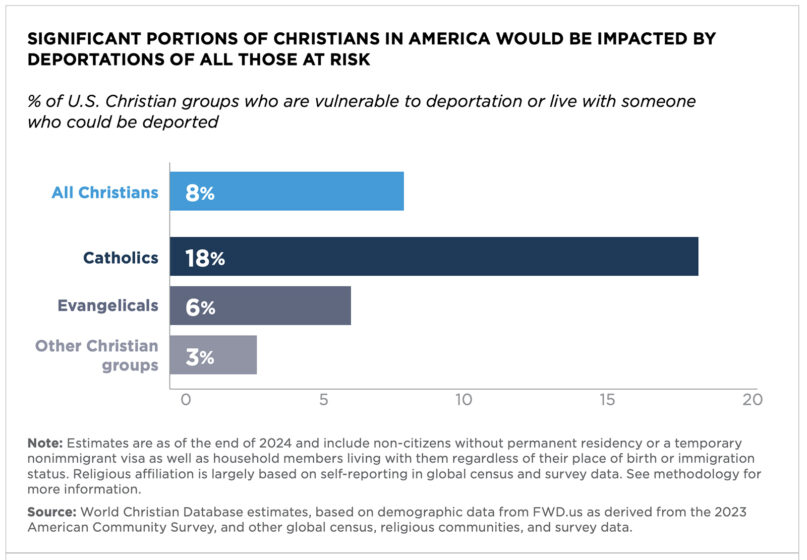
“Significant Portions of Christians in America Would Be Impacted by Deportations of All Those at Risk” (Courtesy graphic)
The report, which does not include legal permanent residents or green card holders in its list of people vulnerable to deportation, also notes that “nearly 7 million U.S.-citizen Christians live within the same households of those at risk of deportation.”
“Most of these U.S. citizens are spouses or minor children of the immigrant at risk of deportation,” the report adds.
The report, which also includes the stories of immigrants as well as religious arguments in defense of migrants, claims 18% of U.S. Catholics are vulnerable to deportation or live with someone who could be deported, as well as 6% of evangelicals in the country and 3% of other Christian groups.
The authors hope the data will help fellow Christians recognize the potential impact of Trump’s proposed deportations on their communities and churches.
“If even a fraction of those vulnerable to deportation are actually deported, the ramifications are profound — for those individuals, of course, but also for their U.S.-citizen family members and, because when one part of the body suffers, every part suffers with it, for all Christians,” the report states.
Anthea Butler, a professor of religious studies at the University of Pennsylvania, said the data could function as a “massive wake up call” for Catholic leaders, noting the report found Catholics make up 61% of those potentially at risk of deportation.
“For Catholic parishes, for Catholic ministries, this is a disaster,” Butler said.
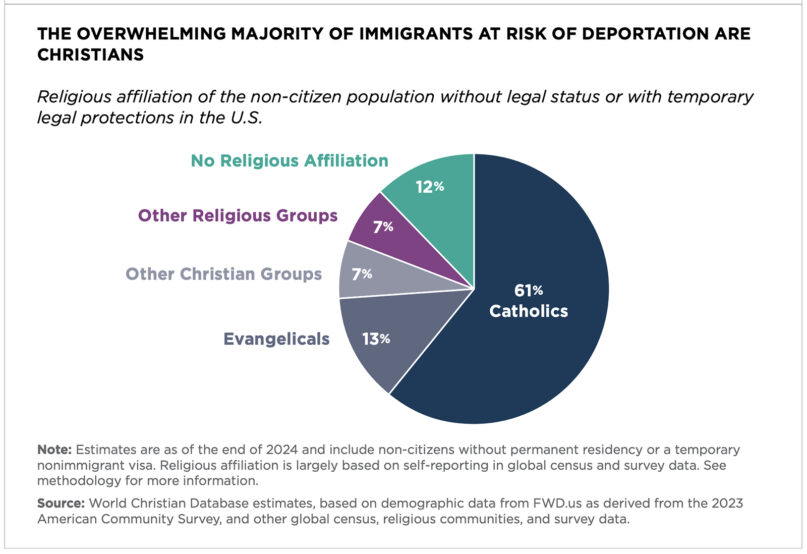
“The Overwhelming Majority of Immigrants at Risk of Deportation are Christians” (Courtesy graphic)
Speaking to reporters on Monday, Bishop Mark Seitz of El Paso confirmed the data shows “Catholics are overrepresented in those currently at risk for deportation,” adding that roughly 1 in 5 Catholics could be deported or have a family member deported under the new administration’s deportation policies.
Evangelical leaders on the call also repeatedly insisted the situation facing evangelicalism is dire.
“We want churches to grow, and … the administration’s mass deportation policies and congressional support of that would be, in fact, a church decline strategy, removing millions from active membership of churches,” Walter Kim, head of the National Association of Evangelicals, told reporters.
Myal Greene, head of World Relief, addressed his own remarks on the call to Republican lawmakers on Capitol Hill, where he used to work.
“We can’t just give a blank check to this effort to carry out mass deportations and mass detentions that would separate families on a massive scale, would decimate the American church and send vulnerable people who have not broken any law into horrifying humanitarian crises,” Greene said.
Trump has faced faith-based pushback to his immigration proposals and policies ever since he first emerged as a political force in 2015, but that criticism has most often come from Mainline Protestant Christians, Jewish Americans and Muslims. Recent weeks have seen unusually pointed criticism emerge from within conservative Christian groups that backed the president in November.
Catholics voted 59% for Trump, but their leadership has issued multiple statements in support of immigrants since Trump was elected, prompting a war of words with Vice President JD Vance. Himself a Catholic, Vance accused Catholic bishops of resettling “illegal immigrants” and suggested in an interview that Catholic bishops are only supporting immigrants in order to protect their “bottom line.” The allegation drew rebukes from leaders such as Bishop Seitz, who called the suggestion “a tremendous mischaracterization.” Even Pope Francis weighed in, with a February letter to U.S. bishops that generally criticized Trump’s immigration policies.
In addition, the Trump administration is currently embroiled in two separate immigration-related lawsuits brought by Catholic groups: One led by the U.S. Conference of Catholic Bishops, which is challenging the federal government over Trump’s decision to freeze the refugee resettlement program, and a similar suit filed by Catholic Charities of the Diocese of Fort Worth, which largely oversees refugee resettlement in Texas.
Butler sees a growing tension between Catholic leadership and many of the people in their pews — a tension she believes clergy “have not really quite dealt with.”
“On one hand, you have a big, giant denomination who is going to be profoundly affected by people being renditioned — and I’m going to use the word renditioned — out of this country who are faithful and loyal Catholics,” Butler said. “But on the other hand, you have Catholic suburbanites and others who voted for Trump who are, like, ‘Okay, this is cool.’”
Evangelicals, a group long deemed crucial to Trump’s support, have been less visible in efforts to challenge Trump on immigration, but Monday’s new report points to increasing — or at least increasingly public — discontent among conservative Protestants. In March, World Relief and other prominent evangelical groups organized a public vigil on Capitol Hill to condemn the administration’s cuts to the U.S. Agency for International Development and foreign aid in general, arguing the changes will cost vulnerable people their lives.
The report organizers suggested Monday that most Christians who voted for Trump either don’t support his immigration policies or don’t fully understand the impact they could have. Kim, head of the NAE, cited recent polling showing that less than one-fifth of evangelicals support deporting immigrants who have spouses or children who are U.S. citizens, have been in the country for 10 years or more, or who are willing to pay a fine as restitution for their violation of any immigration law.
Bishop Seitz agreed.
“The people that are being numbered among those under threat of deportation are not people who are harming our community, but rather building it up,” he said.

